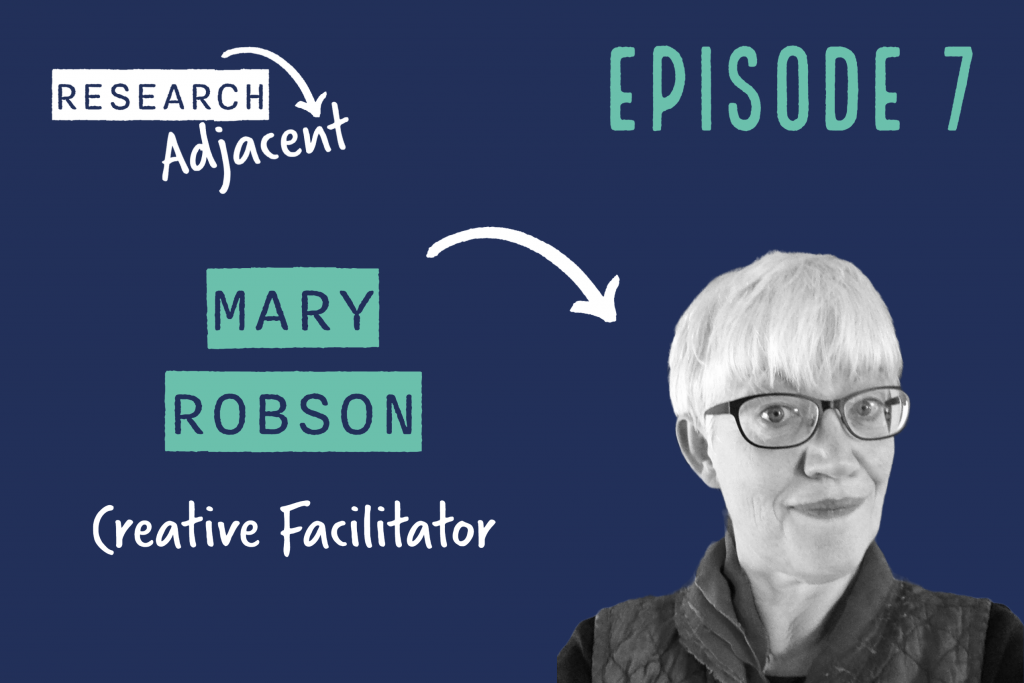Mary Robson, Creative Facilitator (Episode 7) | Mary shares her arts-based approach to creating meaningful connections and allowing space for different opinions

“Creative facilitation is about bringing a potentially very diverse group of people together, and using methods that are arts-based, and experimental sometimes, means that you can form meaningful connections along the way.”
Making things with people
In this episode, Sarah’s guest is (we think) the UK’s only full-time university-based Creative Facilitator, Mary Robson. Mary works at the Institute for Medical Humanities at Durham University.
She describes her approach as ‘making things with people’. Mary went to art school and began her career in theatre design, but gradually moved into working in arts and health. Her involvement with projects focused on the social and emotional development of children led to her being invited into academia to contribute. She began facilitating meetings and this led to a role on Hearing the Voice, an interdisciplinary medical humanities research project. Mary’s task on Hearing the Voice was initially to build the community of the researchers who came from fields as diverse as Psychology, History, Theology, and Literary Studies. Ultimately, Mary’s role was also crucial to engaging and integrating experts-by-experience into the team.
“We’ve gradually built not only a practice around that, but also upped the ante on research culture. I think it’s been fundamental in terms of the intellectual, I should say, development of that project and subsequent ones. And also it’s been a way of injecting communitas into them.”
Creating connections
Mary explains that creative facilitation is fundamentally about bringing a very diverse group together. She uses arts-based techniques to create meaningful connections and allow for different voices and opinions to be held. An example of the impact of Mary’s approach is a recent research development workshop with people from the UK and different African countries. Many of the participants were initially very skeptical about whether they could work together, but by the end of the session there was a clear plan and a sense of collective achievement and bonding.
I’m inordinately proud of that because it was a process that, whilst we had a very strong framework in there, we had to be nimble and reflexive and change things as we went along. And also, I learned a lot.”
Challenging the status quo
Mary’s approach is unusual and at times challenging to the academic status quo. It can also be hard to articulate the benefits of it to people who haven’t experienced it, so it’s not unusual for people to be dismissive about the impact it can make. But there is growing demand for people like Mary who can bring diverse groups of people together to collaborate. Mary and colleagues are currently developing resources and training in creative facilitation to help people understand both how to do it and when it might be appropriate. So, in time, Mary might not be the UK’s only academic creative facilitator – watch this space!
Find out more
- You can connect with Mary on Twitter
- Visit the Durham University Institute for Medical Humanities Creative Facilitation Unit website
- Read the report Creative Facilitation: Transforming understandings and approaches to interdisciplinary and cross-sector research
- Find out more about the next Creative Facilitation Training Course
- Bentley Crudgington
- Pradeep Narayanan
Theme music by Vitaliy Levkin from Pixabay
How was it for you…?
This is a bit of an experiment so I would genuinely appreciate feedback about the podcast. Suggestions for future guests are always welcome too, please drop me an email.
Sign up for episode notifications
If you want to be the first to hear new episodes then please subscribe in your favourite podcast app or sign up below for email notifications.